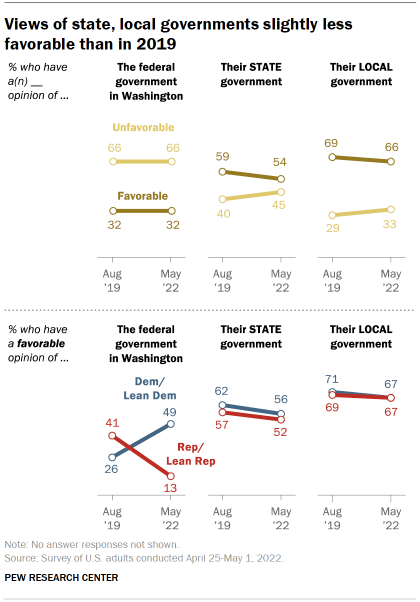
Americans have long had a more favorable view of their state and local governments than the federal government, and this continues to be the case today.
About two-thirds (66%) say they have a favorable view of their local government, compared with 54% who have a favorable view of their state government and just 32% who have a favorable view of the federal government.
The share who say they have a favorable view of the federal government is identical to the share who said this three years ago, though there has been substantial movement within each party. Just over one-in-ten Republicans (13%) now hold a favorable view of the federal government, down from 41% in August 2019. And about half of Democrats (49%) now hold favorable views of the federal government, up from 26% in 2019.
Favorable views of both state and local governments are down slightly since 2019 (5 points and 3 points, respectively).
Both Republicans and Democrats tend to hold more favorable views of their state government if they live in a state where their party is currently in control.
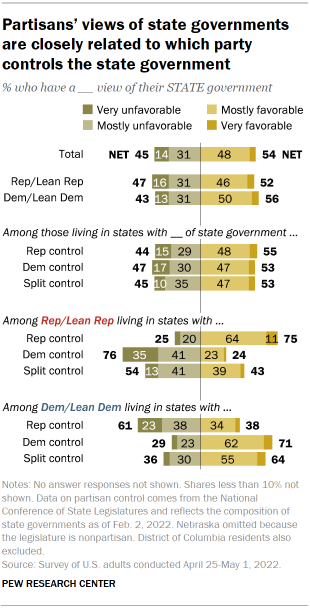
Three-quarters of Republicans living in states with a Republican governor and Republican control of the state legislature have a very favorable (11%) or mostly favorable (64%) view of their state government. A nearly identical share of Republicans living in Democratic-controlled states have unfavorable views of their state government: 35% say they have a very unfavorable view while 41% have a mostly unfavorable view.
Seven-in-ten Democrats living in states with a Democratic governor and a majority-Democratic legislature have a very (8%) or mostly (62%) favorable view of their state government. And about six-in-ten Democrats living in Republican-controlled states (61%) have unfavorable views of their state government: 23% very unfavorable and 38% mostly unfavorable.
Democrats living in states with divided governments (those with split partisan control of the legislature or a governor of one party and a legislature controlled by the other party) generally hold more favorable views of their state government than Republicans living in states with divided governments. More than six-in-ten Democrats living in states with divided control (64%) report favorable views, compared with less than half of Republicans in these states (43%).
Federal and state government relations
When it comes to the relationship between state governments and the federal government, the public expresses a mix of concerns. About a third express a high degree of concern that the federal government does too much on issues they would rather see be left to state governments, while an equal share expresses a high degree of concern that state governments are not willing enough to work with the national government. And while Republicans are more likely than Democrats to express concern about the former, and Democrats are more concerned than Republicans about the latter, about half of those in both parties have at least some concern about both of these things.
At the same time, 43% of Americans are very or extremely concerned that people’s rights and protections might differ from state to state (about two-in-ten say they are not concerned about this), with Democrats more likely than Republicans to express this concern.
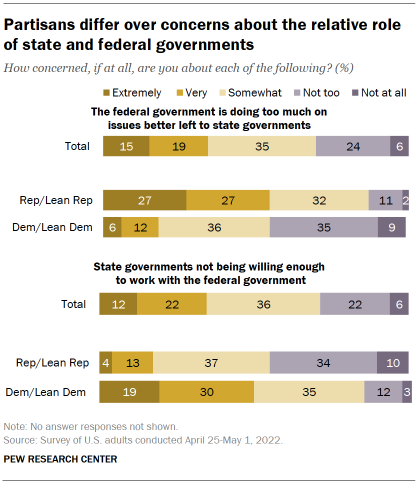
All in all, about a third of the public is extremely (15%) or very concerned (19%) “the federal government is doing too much on issues better left to state governments,” while three-in-ten are not too (24%) or not at all concerned (6%) about this; 35% are somewhat concerned about this occurring.
Similarly, about a third of the public (34%) say they are extremely (12%) or very concerned (22%) about “state governments not being willing enough to work with the federal government.” Nearly three-in-ten (28%) say they are not too (22%) or not at all concerned (6%) about this occurring. An additional 36% say they are somewhat concerned about state governments not working with the federal government.
Republicans and Republican-leaning independents express far higher levels of concern about the federal government’s involvement in issues that can be dealt with at the state level than they are in states not being willing enough to work with the federal government. By contrast, Democrats and Democratic leaners are more concerned that state governments don’t do enough to work with the federal government than they are about the federal government stepping into areas better left to state governments.
More than half of Republicans say they are extremely (27%) or very concerned (27%) about federal government overreach into state-level issues. Another 32% of Republicans say they somewhat concerned about this occurring. Democrats express far lower levels of concerns about this: Just 18% say they are extremely or very concerned about the federal government doing too much on issues better left to the states, while 36% express some concern about this and 45% are not too or not at all concerned about this.
Democrats, by contrast, are more concerned about state governments not being willing to work with the federal government. About half (48%) are extremely or very concerned about this, compared with 18% of Republicans. Another 35% of Democrats say they are somewhat concerned about state governments’ unwillingness to work with the federal government. Fully 44% of Republicans are not too (34%) or at all concerned (10%) that state governments are not willing enough to work with the federal government.
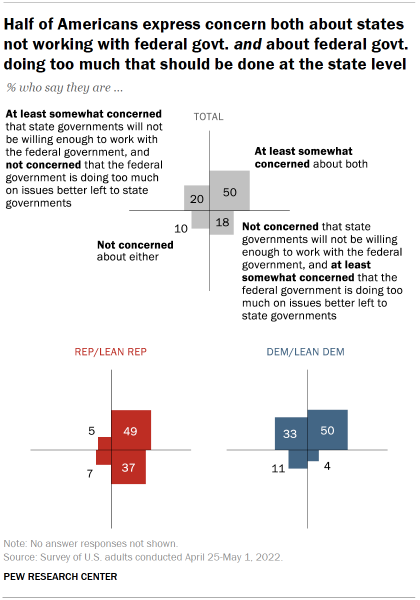
Half of Americans – and similar shares of both Republicans (49%) and Democrats (50%) – express at least some concern both that states are not willing to work with the federal government andthat the federal government is doing too much on issues better left to state governments.
However, about four-in-ten Republicans (37%) say they are at least somewhat concerned that the federal government will overreach on issues better left to state governments but are not concerned about state governments being unwilling to work with the federal government, while just 4% of Democrats hold this combination of views.
In contrast, a third of Democrats are at least somewhat concerned that state governments will not be willing to work with the federal government and are not concerned that the federal government will take on issues that are better suited for state governments, while just 5% hold this combination of views.
Partisans differ in level of concern that rights and protections may vary across states
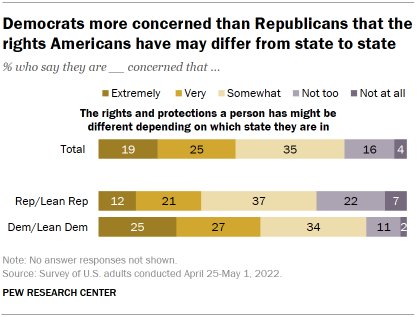
About four-in-ten U.S. adults (43%) say they are extremely or very concerned that the rights and protections a person has might be different depending on which state they live in, with an additional 35% saying they are somewhat concerned about this. About one-in-five are not too (16%) or not at all concerned (4%) about this possibility. (Note: This survey was conducted April 25-May 1, before the May 2 leak of a draft Supreme Court opinion on abortion that suggests that the upcoming court decision would result in states setting their own policies on this issue.)
Democrats are more likely than Republicans to express this concern: 53% say they are concerned that the rights and protections a person has might be different depending on which state they live in, with a quarter saying they are extremely concerned. Roughly a third of Democrats say they are somewhat concerned that the rights and protections a person has might depend on where they live, and just 13% say they are not too or not at all concerned about this.
By contrast, Republicans have fairly mixed views on how concerning they view the possibility of rights and protections differing depending on which state a person lives in: A third of Republicans say they are extremely (12%) or very concerned (21%) about this, while 37% say they are somewhat concerned. About three-in-ten say they are not too (22%) or not at all concerned (7%) about this.
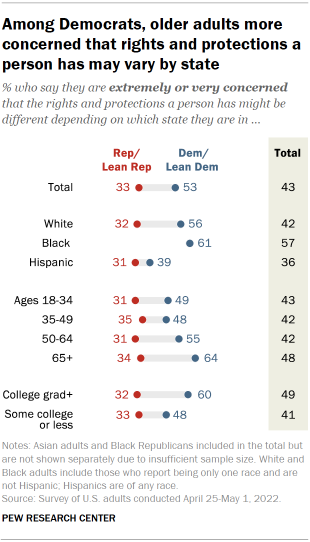
Among Democrats, there are differences across demographic groups in the level of concern that rights and protections might vary from state to state.
While similar shares of White (56%) and Black Democrats (61%) say they are extremely or very concerned that the rights and protection a person has may differ depending on which state they live in, Hispanic Democrats are less likely to say this. Hispanic Democrats are more likely than other Democrats to say they are somewhat concerned individual rights and protection may differ by state.
Older Democrats are more likely than younger Democrats to say they are concerned that the rights a person holds may differ by state: 64% of Democrats ages 65 and older say this, compared with 55% of those ages 50 to 64 and about half of those under the age of 50 (48%).
Among Republicans, there are only modest differences in the level of concern that individual rights and protections may differ from state to state.




